Theological virtues are virtues associated in Christian theology and philosophy with salvation resulting from the grace of God. Virtues are traits or qualities which dispose one to conduct oneself in a morally good manner. Traditionally they have been named Faith, Hope, and Charity, and can trace their importance in Christian theology to Paul the Apostle in 1 Corinthians 13, who also pointed out that charity is the most important.
Donatism was a schism in the Church of Carthage from the fourth to the sixth centuries AD. Donatists argued that Christian clergy must be faultless for their ministry to be effective and their prayers and sacraments to be valid. Donatism had its roots in the long-established Christian community of the Roman Africa province in the persecutions of Christians under Diocletian. Named after the Berber Christian bishop Donatus Magnus, Donatism flourished during the fourth and fifth centuries.
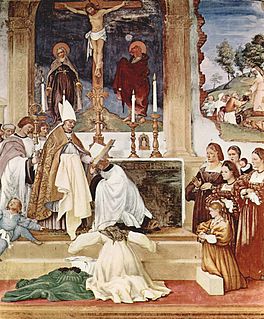
In the teaching of the Roman Catholic Church, an indulgence is "a way to reduce the amount of punishment one has to undergo for sins". It may reduce the "temporal punishment for sin" after death, in the state or process of purification called Purgatory.
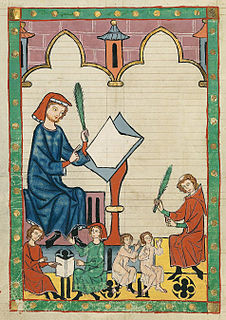
A catechism is a summary or exposition of doctrine and serves as a learning introduction to the Sacraments traditionally used in catechesis, or Christian religious teaching of children and adult converts. Catechisms are doctrinal manuals – often in the form of questions followed by answers to be memorised – a format that has been used in non-religious or secular contexts as well. The term catechumen refers to the designated recipient of the catechetical work or instruction. In the Catholic Church, catechumens are those who are preparing to receive the Sacrament of Baptism. Traditionally, they would be placed separately during Holy Mass from those who had been baptized, and would be dismissed from the liturgical assembly before the Profession of Faith (Creed) and General Intercessions.
Enchiridion is a Late Latin term referring to a small manual or handbook. Some notable enchiridia include:
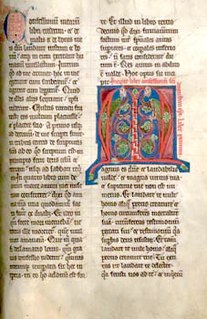
Confessions is the name of an autobiographical work, consisting of 13 books, by Saint Augustine of Hippo, written in Latin between AD 397 and 400. The work outlines Saint Augustine's sinful youth and his conversion to Christianity. Modern English translations of it are sometimes published under the title The Confessions of Saint Augustine in order to distinguish the book from other books with similar titles. Its original title was Confessions in Thirteen Books, and it was composed to be read out loud with each book being a complete unit.
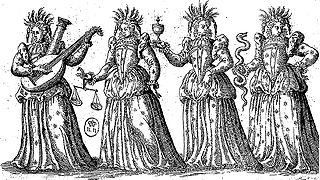
Four cardinal virtues were recognized in the Bible, Old Testament, classical antiquity and in traditional Christian theology:
Prayer has been an essential part of Christianity since its earliest days. Prayer is an integral element of the Christian faith and permeates all forms of Christian worship. Prayer in Christianity is the tradition of communicating with God, either in God's fullness or as one of the persons of the Trinity.

Secretum is a trilogy of dialogues in Latin written by Petrarch sometime from 1347 to 1353, in which he examines his faith with the help of Saint Augustine, and "in the presence of The Lady Truth". Secretum was not circulated until some time after Petrarch's death, and was probably meant to be a means of self-examination more than a work to be published and read by others.
In the history of Christianity, the African Rite refers to a now defunct Christian, Western liturgical rite, and is considered a development or possibly a local use of the primitive Roman Rite. It used the Latin language.
Heroic virtue is a phrase coined by Augustine of Hippo to describe the virtue of early Christian martyrs and used by the Catholic Church. The Greek pagan term hero described a person with possibly superhuman abilities and great goodness, and "it connotes a degree of bravery, fame, and distinction which places a man high above his fellows". The term was later applied to other highly virtuous persons who do extraordinary good works.

De doctrina Christiana is a theological text written by Saint Augustine of Hippo. It consists of four books that describe how to interpret and teach the Scriptures. The first three of these books were published in 397 and the fourth added in 426. By writing this text, Saint Augustine set three tasks for Christian teachers and preachers: to discover the truth in the contents of the Scriptures, to teach the truth from the Scriptures, and to defend scriptural truth when it was attacked.
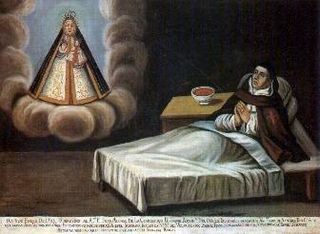
Mystical theology is the branch of theology that explains mystical practices and states, as induced by contemplative practices such as contemplative prayer.

Mental prayer is a form of prayer recommended in the Catholic Church whereby one loves God through dialogue, meditating on God's words, and contemplation of Christ's face. It is distinguished from vocal prayers which use set prayers, although mental prayer can proceed by using vocal prayers in order to improve dialogue with God. And no prayer is purely vocal, as it has traditionally been defined: "Prayer is the raising of one's mind and heart to God."
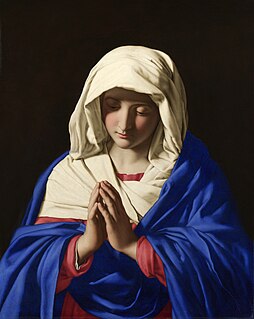
In the Catholic Church, prayer is "the raising of one's mind and heart to God or the requesting of good things from God." It is an act of the moral virtue of religion, which Catholic theologians identify as a part of the cardinal virtue of justice.
Indulgentiarum Doctrina is an apostolic constitution about indulgences issued by Pope Paul VI on 1 January 1967. It responds to suggestions made at the Second Vatican Council, it substantially revised the practical application of the traditional doctrine relating to indulgences. The title is taken from the opening words of the original Latin text.
Prayer is an important activity in Christianity, and there are several different forms of Christian prayer.
Spiritual Communion is a Christian practice of desiring union with Jesus Christ in the Holy Eucharist. It is used as a preparation for Holy Mass and by individuals who cannot receive Holy Communion.

The love of Christ is a central element of Christian belief and theology. It refers to the love of Jesus Christ for humanity, the love of Christians for Christ, and the love of Christians for others. These aspects are distinct in Christian teachings—the love for Christ is a reflection of his love for his followers.














